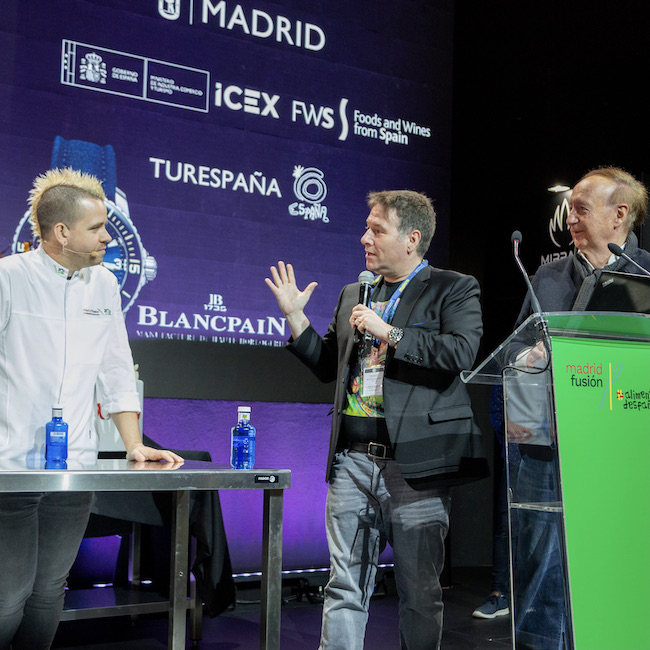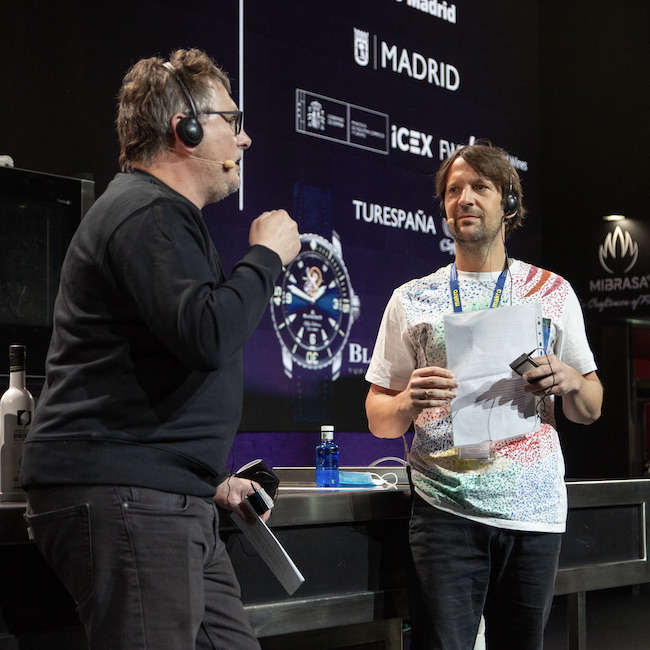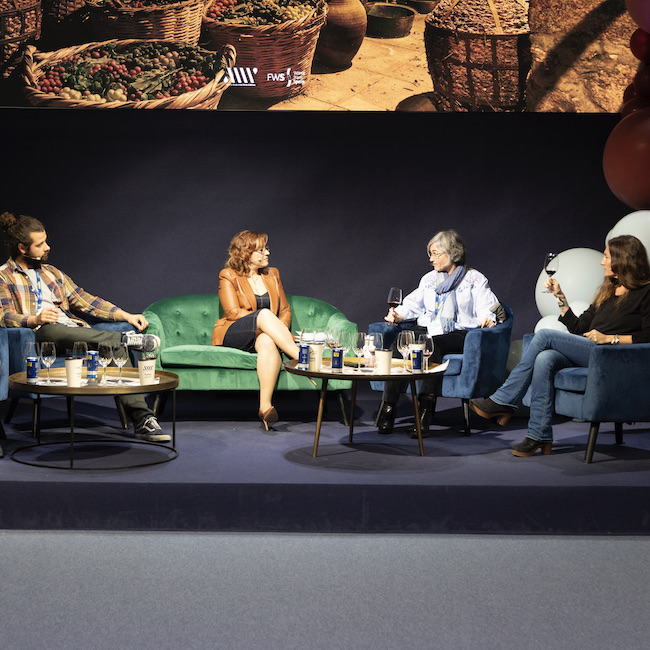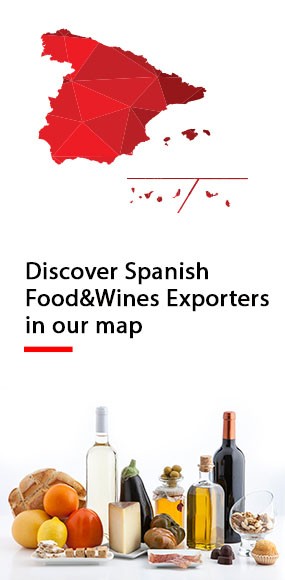.png.transform/rendition-xs/image_image%20(1).png)
Madrid Fusión Alimentos de España 2022: the Thousand and One Faces of Gastronomy
The 2022 edition of the event highlights the incomparable moment for Spanish gastronomy, with a program filled with debate, reflection, cuisine, and emotion.
Gastronomy has many faces, all of which can be equally valuable. This was visible at the 2022 edition of Madrid Fusión Alimentos de España, a highly ambitious conference that always reaches new heights, in which chefs, sommeliers, and professionals of all kinds cooked, debated, and answered questions from the public. This year's event saw record breaking numbers: 16,500 visitors, 1,171 participants in the main auditorium, and 1,038 journalists from across the globe, proving that there's no event like it in the world. These numbers highlight the unstoppable rise of gastronomy, coinciding with the conference's 20th anniversary. Its popularity was obvious during some of the buzzworthy events, such as Dabiz Muñoz's presentation (DiverXO, Madrid) in the auditorium. The chef—who represents the past, present, and future of Spanish gastronomy—did not cook or present any project, but he did explain his roadmap for the coming years, answering questions from the audience. Muñoz commented that he still has many dreams to fulfill in the kitchen, that the new DiverXO will open in two years, that he aspires to make it "the best restaurant in the world," and that he plans to be on the culinary scene for quite a while. René Redzepi (Noma, Copenhagen) was another of the eagerly anticipated speakers. He had not attended the event in 16 years and his presentation, where he discussed ideas and concepts with Andoni Luis Aduriz (Mugaritz, San Sebastián), was one of the biggest crowd pleasers. Redzepi highlighted the neverending importance of elBulli and defined "the avant-garde" as the capacity to "innovate, manage a team, purchase food, along with a restaurant's values."

Acidic cuisine, salt-cured foods, territory, and lots and lots of vegetables
Of course, there was a lot of cooking. Mario Sandoval (Coque, Madrid) spoke about letting marinades sit to achieve new textures. Quique Dacosta (Quique Dacosta Restaurant, Denia, Alicante) spoke about salt-cured foods as well as beauty in the kitchen, with an emotional dessert in homage to his mother. The rise of "territorial cuisines" was also discussed in presentations like that of Iván Cerdeño (Restaurante Iván Cerdeño, Toledo), who depicted the identity of his land in contemporary, sensible dishes. Another unstoppable movement is that of vegetable-based cuisine, highlighted by such established chefs as Joan Roca (El Celler de Can Roca) and Rodrigo de la Calle (El Invernadero, Madrid).
The event that just ended was also the one with the largest number of chefs from other countries on stage, from the social and artistic proposal of Rasmus Munk (Alchemist, Copenhagen) to the simple cuisine of Antonia Klugmann (L'Argine a Vencó, Dolegna del Collio, Italy), including one of the most exciting moments of the conference: the participation of Ukrainian chef Ksenia Amber, who arrived from Odessa and brought the auditorium to its feet by preparing a borscht, a soup that reflects all of her country's gastronomy.

There were also recognitions and awards at Madrid Fusión Alimentos de España. Chef Luis Alberto Lera (Lera, Castroverde de Campos, Zamora) received the Alimentos de España award for his commitment to regional cuisine based on game, that pays tribute to its own heritage. Pedro Aguilera took home the Best New Chef award, which is usually an important accolade for the recipient's career and which, in past editions, went to influential names such as Dabiz Muñoz and Valencian chef Ricard Camarena.
The Wine Edition Wines from Spain: an exciting world to explore
The conference within a conference that is The Wine Edition Wines from Spain, sponsored by Food & Wines from Spain, grew exponentially in its second edition, giving prominence to forgotten vineyards, off-the-beaten-path pairings, and the changes taking place in some of Spain's most emblematic DOs. In the tasting entitled "The Silent Rioja Revolution," three producers have brought fresh air to the DO, dedicating themselves to old vineyards, hyperlocal production linked to each village's unique characteristics, and grapes such as Garnacha. "Rioja is one of the regions with the most variety, talent, and charisma in Spain at the moment," said Alberto Gil, journalist and writer from La Rioja and the tasting's moderator. Other presentations looked at the new ways of making wine in Jerez, and the recovery of hard-to-access vineyards in the mountains with complicated yields, an initiative that is as much about passion as it is about heroism. Another presentation, "Innovation for Conservation," brought together winemakers from Rioja, Priorat, Jumilla, and Costers del Segre for a passionate debate that sought to recover knowledge of ancestral varieties and ancient cultivation methods and winemaking techniques.

Spanish wines' ability to adapt to any type of pairing was also a common thread in many of the presentations, allowing for pairings with desserts, chocolate, and truffles. Spanish wine also pairs beautifully with other cultures, as in the case of the presentation by Albert Raurich and Tamae Imachi (Dos Palillos, Barcelona), who connected with Asian flavors with an Oloroso VORS from Jerez, "perfect to accompany caramelized Iberian pork jowl with Cantonese sauce." The uniqueness of the current Spanish wine offer was also visible in a session where "radical" proposals were presented, such as a Pedro Ximénez from Priorat and a long-aged txakoli.
The Wine Edition Wines from Spain also reflected on the legacy of elBulli, a steady beacon on which to focus during this 20th anniversary. The second edition of the Juli Soler award, in memory of the maitre d’ at the legendary restaurant, went to winemaker Carlos Cerdán (Bodega Cerrón); Rioja winemaker José Gil; sommelier Maikel Rodríguez (Restaurante Iván Cerdeño); the creator of Mûd Wine Bar, Carlos Casillas; and sommelier Shua Ibáñez (Arzak, San Sebastián). They will ensure that wine professions remain relevant for years to come.

